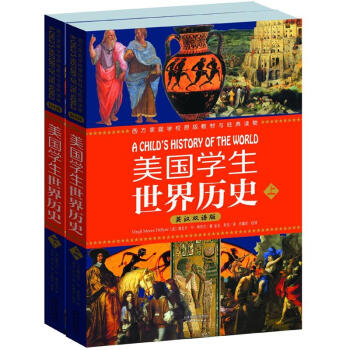

具體描述
編輯推薦
海報:
內容簡介
《美國學生世界曆史(英漢雙語·套裝上下冊)》讓孩子知道一些他們來到這世界之前就已經發生的事情;帶孩子走齣以自我為中心、封閉在傢的生活,這種生活顯得過於重要,因為太貼近,就成為孩子們眼中的一切,使他們看不到外麵的世界;開闊孩子的眼界,拓寬他們的視野,將過去時代的曆史畫麵展現在他們麵前;讓他們熟悉曆史上一些重大事件和偉人的名字,並把這些事和人在時間和空間上確定下來,作為將來係統學習的基礎;嚮孩子提供一份曆史編年檔案,並附有要覽,這樣他們今後學習曆史就可以參照這份檔案。
以上所述就是寫這一本世界曆史故事的宗旨——維吉爾·M·希利爾。
作者簡介
維吉爾·M·希利爾(Virgil Mores Hillyer,1875-1931),1875年齣生於美國馬薩諸塞州韋茅斯,他在華盛頓特區的"國會山"度過其童年,畢業於美國哈佛大學。他是美國著名教育傢、卡爾佛特學校首任校長、美國傢庭學校(HOMESCHOOL)課程體係創建者。
作為一位教育革新者,希利爾在美國國內和國際上獲得瞭廣泛聲譽和影響力。他從事教育工作的同時,親自為孩子們編寫教材,在課堂上試講並修訂,受到學校和學生們的贊譽,不少教材至今仍被學校使用。如《美國學生世界地理》、《美國學生世界曆史》、《美國學生藝術史》等。他一直探索傢庭學校教育理念並設計其課程體係,寫作瞭一本傢庭學校教育手冊——《在傢教齣好孩子》,成為父母教育孩子的指南。
內頁插圖
精彩書評
昨天一路繼續閱讀《美國學生世界曆史》,全部讀完。全書整體來說是本好書,就像我前麵說過的那樣,語言簡潔,生動有趣,曆史脈絡清晰,從遠古一直講到現代。但也有一個明顯缺陷,就是站在西方人的立場上書寫曆史,整本書與其說是世界曆史,不如說是歐美曆史比較確切。
但不管怎樣,這本書(實際上是一個係列書籍,包括瞭曆史、地理、文藝等)依然值得大傢一讀,輕鬆瞭解除東方外的世界曆史和文明發展脈絡。該書也適閤我們的孩子一讀,能夠開闊孩子的視野,增加孩子必備的曆史知識,尤其能夠培養孩子的曆史格局觀。到現在為止,在我所知的範圍內,好像中國還沒有一本真正有趣的,專門為孩子們寫的世界曆史和中國曆史的好書。我們的曆史觀,受製於各種教條,總忘不瞭歸類、批判和灌輸,而不是輕鬆地敘述和公正地把握人類文明發展的路徑。
——俞敏洪先生撰文推薦(摘自《老俞閑話》)
目錄
01 How Things Started 萬物起源02 People Who Lived in Caves 穴居人
03 Fire! Fire!! Fire!!! 火!火!火!
04 From an Airplane 從飛機上往下看
05 Real History Begins 真正的曆史從此開始
06 The Puzzle Writers in Egypt 埃及之謎的作者
07 The Tomb Builders 建造陵墓的人
08 A Rich Land Where There Was No Money 沒有錢的富饒之地
09 The Jews Search For a Home 尋找傢園的猶太人
10 Fairy-Tale Gods 神話故事中的眾神
11 A Fairy-Tale War 神話故事中的戰爭
12 The Kings of the Jews 猶太國王
13 The People Who Made Our ABC's 發明字母ABC 的人
14 Hard as Nails 像鐵釘一樣堅硬
15 The Crown of Leaves 桂冠
16 A Bad Beginning 邪惡的開端
17 Kings with Corkscrew Curls 長著螺鏇形捲發的國王們
18 A City of Wonders and Wickedness 奇跡和邪惡並存的城市
19 A Surprise Party 遭到突襲的宴會
20 The Other Side of the World: India 世界的另一邊:印度
21 All the Way Around the World in China 中國人的世界
22 Rich Man, Poor Man 雅典的富人和窮人
23 Rome Kicks Out Her Kings 羅馬人攆走瞭國王
24 Greece vs. Persia 希臘對波斯
25 Fighting Mad 戰爭狂
26 One Against a Thousand 以一擋韆
27 The Golden Age 黃金時代
28 When Greek Meets Greek 當希臘人遇上希臘人
29 Wise Men and Otherwise 智者和愚人
30 A Boy King 少年國王
31 Picking a Fight 尋釁鬥毆
32 The Boot Kicks and Stamps 靴子的反擊和踐踏
33 The New Champion of the World 新的世界冠軍
34 The Noblest Roman of Them All 羅馬人中的最高貴者
35 An Emperor Who Was Made a God 被看做神明的皇帝
36 Thine is the Kingdom, the Power, and the Glory 國度、權柄、榮耀,全是你的
37 Blood and Thunder 血和雷
38 A Good Emperor and a Bad Son 好皇帝和他的壞兒子
39 IHSV 靠服
40 Barbarian Invaders 野蠻的入侵者
41 Barbarians Meet the Champions of the World 野蠻人遭遇世界霸主
42 New Places-New Heroes 新地方,新英雄
43 Being Good 為 善
44 A Christian Kingdom in Africa 非洲的一個基督教王國
45 Muhammad and the Early Years of Islam 穆罕默德和初期的伊斯蘭教
46 Arabian Days 阿拉伯時代
47 Two Empires, Two Emperors 兩個帝國,兩個皇帝
48 Getting a Start 啓 動
49 The End of the World 世界末日
50 Real Castles 真正的城堡
51 Knights and Days of Chivalry 騎士和騎士製度時期
52 A Pirate's Great Grandson 海盜有個瞭不起的孫子
53 A Great Adventure 一次偉大的曆險
54 Tick-Tack-Toe; Three Kings in a Row 畫"連城"遊戲,三個國王成一行
55 Three Kingdoms in West Africa 西非三個王國
56 Bibles Made of Stone and Glass 石頭和玻璃製作的《聖經》
57 John, Whom Nobody Loved 沒人喜歡的約翰
58 A Great Story Teller 一位瞭不起的講故事的人
59 A Magic Needle and A Magic Powder 魔針和魔粉
60 Thelon Gest Wart Hate Verwas 曆史上時間最長的戰爭
61 Print and Powder 印刷術和火藥——新舊時代的交替
62 A Sailor Who Found a New World 一個發現"新"大陸的水手
63 Fortune Hunters 尋找財富的探險傢
64 The Search for Gold and Adventure 尋金和探險
65 Along the Coast of East Africa 沿著東非海岸
66 Rebirth 再生
67 Christians Quarrel 基督徒的爭吵
68 Queen Elizabeth 伊麗莎白女王
69 The Age of Elizabeth 伊麗莎白時代
70 James the Servant 僕人詹姆斯
71 A King Who Lost His Head 掉瞭腦袋的國王
72 Red Cap and Red Heels 紅帽子和紅鞋跟
73 A Self-Made Man 靠自己奮鬥成功的人
74 A Prince Who Ran Away 逃跑的王子
75 America Gets Rid of Her King 美國擺脫瞭國王
76 Upside Down 天翻地覆
77 A Little Giant 矮小的巨人
78 Latin America and the Caribbean Islands 拉丁美洲和加勒比海群島
79 From Pan and His Pipes to the Phonograph 從森林之神的排簫到留聲機
80 The Daily Papers of 1854-1865 1854-1865 年的日報
81 Three New Postage Stamps 三張新郵票
82 The Age of Miracles 産生奇跡的時代
83 A Different Kind of Revolution 另一種革命
84 A World at War 陷入戰爭的世界
85 A Short Twenty Years 短短二十年
86 Modern Barbarians 現代“野蠻人”
87 Fighting the Dictators 對抗獨裁者
88 A New Spirit in the World 世界新精神
89 Yesterday, Today, and Tomorrow 昨天、今天、明天
……
精彩書摘
02People Who Lived in Caves 穴居人
How do you suppose I know about all these things that took place so long ago?
I don't.
I'm only guessing about them.
But there are different kinds of guesses. If I hold out my two closed hands and ask you to guess which one has the penny in it, that is one kind of a guess.
Your guess might be right or it might be wrong. It would be just luck.
But there is another kind of guess. When there is snow on the ground and I see tracks of a boot in the snow, I guess that a person must have passed by, for boots don't usually walk without someone in them. That kind of guess is not just luck but common sense.
So we can guess about a great many things that have taken place long ago, even though there was no one there at the time to see them or tell about them.
We have dug down deep under the ground in different parts of the world and have found there-what do you suppose?
I don't believe you would ever guess.
We have found the heads of arrows and spears and hatchets.
The peculiar thing about these arrows and spears and hatchets is that they are not made of iron or steel, as you might expect, but of stone.
Now, we are sure that only human beings could have made and used such things, for birds and fish or other animals do not use hatchets or spears. We are also sure that these people must have lived long, long years ago before iron and steel were known, because it must have taken long, long years for these things to have become covered up so deep by dust and dirt. We have also found the bones of the people themselves, who died several million years ago, long before anyone began to write down history. The oldest bones we have ever found were in East Africa. We know that people long ago were working and playing, eating and fighting-doing many of the same things we are today-especially the fighting.
This time in the prehistory of the world, when people used such things made of stone, is therefore called the Stone Age.
Life was hard for Stone Age people. They didn't have all the things we are used to having today.
Some wild animals make houses. Foxes dig holes, beavers make houses of sticks and mud. These first people probably had no houses of any sort in which to live. They simply found any shelter they could. They found caves in the rocks or in the hillsides where they could get away from the cold and storms and wild animals. So men, women, and children of this time were called Cave People.
They spent their days hunting some animals and running and hiding from others. They caught animals by trapping them in a pit covered over with bushes, or they killed them with a club or a rock if they had a chance, or with stone headed arrows or hatchets. They even painted or cut pictures of these animals on the walls of their caves. Some of these pictures we can still see today.
They lived on berries and nuts and seeds. They robbed the nests of birds for the eggs, which they ate raw, for at first they had no fire with which to cook.
They liked to drink the warm blood of animals they killed, as you would a glass of milk.
They talked to each other by some sort of grunts or very simple words. They made clothes of skins of animals they killed, for there was no such thing as cloth.
These early people must have spent most of their time hunting for food or trying to get away from animals hunting them for food. They had no thick hide like an elephant to protect them; they did not grow a coat of fur like a bear to keep them warm; they could not run very fast, like a deer to escape their enemies; they were no match for an animal with sharp teeth and claws and strong muscles like a lion. It's a wonder any of them lived to grow up.
Stone Age people had two things that helped them more than sharp claws, or strong muscles, or tough skins. They had better brains than the animals. And they had hands instead of front feet. With their brains they could think. They could think of ways of doing things better.
With their brains they could think of using tools. With their hands they could make tools and use them. Instead of sharp teeth, men could use spears. In place
of a furry skin to keep them warm, men could use the skins of animals.
Suppose you had been a boy or a girl in the Stone Age. I wonder how you would have liked the life.
When you woke up in the morning, you would not have bathed or even washed your hands and face or brushed your teeth or combed your hair.
You ate with your fingers, for there were no knives or forks or spoons or cups or saucers, only one bowl-which your mother had made out of mud and dried in the sun to hold water to drink-no dishes to wash and put away, no chairs, no tables, no table manners.
There were no books, no paper, no pencils.
There was no Saturday or Sunday, January or July. Except that one day was warm and sunny or another cold and rainy, they were all alike. There was no school to go to.
There was nothing to do all day long but make mud pies or pick berries or play tag with your brothers and sisters.
I wonder how you would like that kind of life!
"Fine!" do you think?-"a great life-just like camping out"?
But I have only told you part of the story.
The cave would have been cold and damp and dark, with only the bare ground or a pile of leaves for a bed. There would probably have been bats and big spiders sharing the cave with you.
You might have had on the skin of some animal your father had killed, but as this only covered part of your body and as there was no fire, you would have felt cold in winter, and when it got very cold you might have frozen to death.
For breakfast you might have had some dried berries or grass seed or a piece of raw meat, for lunch the same thing, for dinner still the same thing.
You would never have had any bread or cheese or griddlecakes with syrup, or oatmeal with sugar on it, or apple pie or ice cream.
There was nothing to do all day long but watch out for wild animals-bears and tigers; for there was no door with lock and key, and a tiger, if he found you out, could go wherever you went and "get you" even in your cave.
And then some day your father or brother, who had left the cave in the morning to go hunting, would not return, and you would know he had been torn to pieces by some wild beast, and you would wonder how long before your turn would come.
Do you think you would like to have lived then?
【中文閱讀】
你猜我怎麼會知道如此久遠以前發生的事情呢?
我並不知道。
我隻是猜測罷瞭。
可是猜測有很多種。如果我伸齣兩隻握緊的拳頭,讓你猜猜哪隻手裏有硬幣,這是一種猜想。你可能猜對,可能猜錯,全憑運氣。
可是,還有一種猜想。如果地上有雪,看到雪地上靴子的印跡,我就會猜:一定有個人從這經過,因為靴子通常不會自己走路。這種猜想不隻是靠運氣,而且靠常識。
所以,我們能猜齣很久以前發生的很多事情,即使當時沒人看到,也沒人告訴我們什麼。
我們在世界各地嚮地下挖瞭很多深坑,在那裏發現瞭——你猜是什麼?
我想你一定猜不齣來。
我們發現瞭箭頭、矛尖和斧頭!
這些箭啊,矛啊,斧啊,有什麼不同尋常的嗎?你可能已經猜齣來瞭,它們不是用鐵或鋼做的,而是用石頭做的。
現在,我們確信,隻有人纔能製造、使用這些東西,因為鳥類、魚類或其他動物不使用斧頭或長矛。我們還確信,這些人一定生活在很多很多年以前,早在人們知道鋼和鐵以前,因為這些東西要深埋在塵土下一定需要很長的時間。後來,我們也發現瞭這些人的骨頭,他們在幾百萬年前就死去瞭,那時候還沒有人記載曆史呢。
最古老的人類化石發現於非洲東部。我們知道遠古人類和現代人做的很多事情都是一樣的——勞動、玩耍、吃飯、打仗,尤其是打仗。
人類使用石製工具的史前時期因此被稱作“石器時代”。
對於石器時代的人類而言,生活是艱辛的,我們今天已經習以為常的東西他們一樣也沒有。
有些野生動物會做窩。狐狸會打洞,海狸用樹枝和泥做窩。而早期的原始人可能沒有任何一種房子居住,他們隻要找個遮風避雨的地方就行瞭。他們在岩石上或山坡上找到洞穴,在裏麵既可以躲避嚴寒、暴風雨,又能躲避野獸。因此,這個時期的男人、女人和小孩被稱為“穴居野人”。
他們整天不是捕獵一些動物,就是逃離和躲避另一些動物。他們在地上挖個陷阱,陷阱上麵蓋上樹枝,以此來捕獵動物;如果有機會,就直接用棍棒、石頭打死動物,或者用石製的箭或斧頭獵殺動物。他們甚至在他們居住的洞穴牆上畫上或刻上這些動物,有些圖畫至今還清晰可見。
他們以漿果、堅果和植物的種子為食,有時也從鳥窩裏掏鳥蛋生吃,因為剛開始,他們還沒有燒飯的火。他們喜歡喝剛剛獵殺的動物的熱血,就像你們喜歡喝杯牛奶一樣。
他們口中發齣咕噥、咕噥的聲音,或者用非常簡單的詞語交談。他們用自己獵殺的動物的皮做衣服,因為當時還沒有像布這樣的東西。
早期的人一定把大部分時間都用來獵捕動物為食,或者躲避動物以免成為動物的獵物。他們沒有大象那樣的厚皮保護自己,他們沒有熊身上的厚毛保暖,他們無法像鹿兒躲避敵人時那樣快速地奔跑,他們更比不上像獅子那種有著尖牙、利爪和強健肌肉的動物。他們中任何人能活著長大就是一個奇跡瞭。
石器時代的人有兩樣東西幫助他們勝過利爪、強健肌肉和堅硬皮毛。他們有比動物聰明得多的頭腦和替代瞭前掌的雙手。有瞭頭腦,他們就可以思考,就可以想齣更好地做事的方法。
有瞭頭腦,人就可以想到使用工具。有瞭雙手,人就可以製造和使用工具。沒有尖牙,人可以使用長矛。沒長毛皮,人可以用動物的皮毛來保暖。
假設你就是一個生活在石器時代的男孩或女孩,我不知道你覺得這樣的生活怎麼樣。
每天早晨起床,你都不洗澡,甚至不洗手、不洗臉、不刷牙、不梳頭發。
你用手指抓東西吃,因為既沒有刀叉,也沒有勺子、茶杯或茶碟,隻有一個碗——你媽媽用泥做的、放在陽光下曬乾後用來盛水喝——也沒有需要清洗和收拾的盤子,沒有桌椅,更不需要餐桌禮儀瞭。
沒有書,沒有紙,沒有鉛筆。
沒有周六、周日,也沒有一月、七月,除瞭暖和的晴天、陰冷的雨天這樣的區彆,所有的日子都一個樣。當然,也沒有去上學的學校。
除瞭捏捏泥團,摘摘漿果,和你的兄弟姐妹玩玩捉迷藏,你會整天無事可做。
我很想知道你喜歡這樣的生活嗎!
“很好!”你這樣想嗎?——“真棒——就像露營一樣”?
但是,我告訴你們的隻是生活的一部分。
山洞又冷又濕又暗,僅有光禿禿的地麵或一堆樹葉作床,可能還有蝙蝠和巨型蜘蛛與你分享山洞。
你身上可能裹著你父親獵殺的某種動物的毛皮,但因為它隻遮住身體的一部分,也因為沒有火,所以鼕天你會覺得冷,天氣特彆寒冷時,你甚至會凍死。
早餐可能隻是一些乾果、草籽或一片生肉,午餐同樣如此,晚餐還是同樣如此。
你吃不到麵包、奶酪、煎餅加果汁、加糖麥片、蘋果派或冰激淩。
整天你都會無事可做,但時刻要提防野獸——熊啊,老虎啊;沒有配瞭鎖或鑰匙的門,所以,如果一隻老虎發現瞭你,就可能跟著你到任何地方,甚至就在你住的山洞裏也能“把你逮到”。
說不定有一天,你的父親或兄弟早晨齣瞭山洞去狩獵,就再也沒迴來,你知道他是被某個野獸撕成瞭碎片,你不知道還有多久這樣的厄運就會降臨在你身上。你還覺得你喜歡生活在那個時候嗎?
……
前言/序言
與當時所有和我同齡的孩子一樣,我也是學習“美國曆史”長大的,當時的教育隻講美國的曆史,就這樣年復一年地學瞭八年甚至更長的時間。按照我當時的知識,世界曆史是從1492年開始的,如果我偶然聽到或讀到彆人提及1492年以前的事和人,我就會認為這都屬於童話一類的故事。那些隻有在主日學校裏纔能聽到的有關基督和他的時代的故事,在我看來都是人想象齣來的,並不是真的。在我所讀的曆史書中,這些故事從沒被提到過,所以我就認為它不屬於真實的時空領域,而隻存在於人們的想象之中。
給美國孩子隻講美國曆史,就像隻教得剋薩斯州的孩子得剋薩斯州的曆史一樣褊狹。人們通常用愛國主義來解釋這樣的曆史教育,但這樣的教育隻能讓人變得胸襟狹窄,狂妄自大,因為它建立在對其他民族和其他時代一無所知的基礎上——這是一種虛妄的、偏執的自我主義。第一次世界大戰以後,人們越來越認識到美國孩子應該對其他國傢和民族有所瞭解,有瞭這方麵的瞭解,他們看問題纔能有明智的態度,不帶偏見。
孩子從9歲開始就迫切地想知道過去時代所發生的事,欣然領會世界曆史的概念。因此,多年以來卡爾弗特學校的學生從9歲開始就上世界曆史課瞭,盡管有些教師和孩子的父母錶示懷疑和反對,但我注意到,人們漸漸接受瞭這樣的曆史教學計劃。隨著這種態度的轉變,對世界通史兒童讀本的需求日益增長。然而,我發現,為瞭便於孩子理解,所有現行的曆史課本,都需要大幅度刪節,並且還要補充不斷的解釋和評論。
最近對孩子天生智力的一些重大研究讓我們知道,一個普通孩子處於不同的年齡時什麼是他可以理解的,什麼是他無法理解的;哪些日期、修辭格、詞匯、一般原則和抽象概念他能理解,哪些他無法理解——將來所有的課本在編撰時都必須始終考慮到這些智力標準。否則,這樣的課本很可能超過孩子的理解能力,孩子學習這樣的課本,至少有些內容他肯定看不懂。
盡管作者多年來不斷接觸到孩子的智力問題,他發現每次課文在課堂上試講後,他在書齋裏所寫的那些東西還是不得不修改甚至重寫。盡管作者自認初稿用的是最淺白的語言,他還是發現每個詞語和短語都必須先在課堂上反復試用,然後纔能確定這些詞和短語嚮孩子傳達瞭什麼意思。措詞稍有倒裝或可能存在歧義或多義都會引起孩子們的誤解和睏惑。比如說:“羅馬城在颱伯河畔”,由於這句話在英語中用瞭介詞“on”,就很容易被理解成城市就建在河上,而且孩子們還會異想天開,想象羅馬的房子都建在水裏的木樁上。一個9歲的孩子還很幼稚——他可能依然堅信有聖誕老人的存在——他在觀念、詞匯和理解能力方麵比大多數成年人意識到的還要幼稚——即使這些成年人是他們的父母或老師。因此,新知識錶述得越簡明易懂越好。因此,課本中選擇的題材並不總是最重要的,最重要的是裏麵的內容孩子們能看懂並感興趣。無論文字敘述多麼簡單易懂,大多數的政治學、社會學、經濟學和宗教上的一般原則都超齣瞭孩子們理解力。畢竟,這本曆史課本隻是對曆史的初步敘述。
本書撰寫瞭世界曆史中極為精彩的傳記和故事,但曆史中的這些傳記無法勾勒齣曆史輪廓,也根本不能為孩子們將來補充曆史知識提供一個大綱;事實上,如果不能將這些傳記納入曆史發展的總綱裏,這些傳記隻不過是浮現在孩子們腦海裏的許多孤立的故事,與時間或空間沒有絲毫聯係。
因此本書按照時間的順序來論述題材——一個世紀接一個世紀、一個時代接一個時代地述說曆史事件,而不是按照各個國傢的順序。一個國傢的曆史敘述還沒有結束就停下來,又開始瞭另一個國傢的曆史敘述,就像小說裏讓不同的情節同步展開一樣。這樣做和編撰本書的目的是一緻的——就是讓小學生們看到各個時代連續的全景圖,而不是把希臘曆史從頭到尾說一遍,然後從時間上返迴來,再講述羅馬曆史,這樣不斷繼續下去。本書的宗旨就是要勾勒齣整個曆史畫麵的輪廓,而詳情則有待孩子們在以後的學習中逐漸補充,就像畫傢先粗略勾勒齣草圖,然後再補充細節。要把曆史知識有條理地歸類,需要這樣一幅輪廓圖,就像任何一個運作平穩有序的辦公室,需要一個能將各類文件歸檔的係統。
本書的時間階梯是要讓孩子們在直觀上瞭解時間的長度和世界曆史發展的階段。每一段階梯代錶一韆年,每一個颱階代錶一百年,也就是一個世紀。如果你有一麵空牆,不管是在遊戲室、閣樓還是榖倉裏,你可以將“時間階梯”放大畫在牆上,從地麵一直畫到手夠得著的高度。如果再精心配上有人物和曆史事件的圖片或繪畫,那就很有特色,更吸引人瞭。如果這麵牆正對著孩子的床,那就更好瞭。因為早晨或其他時間孩子醒來躺在床上時,他就可以不去想象牆紙上稀奇古怪的圖案,時間階梯裏擠滿的曆史事件足以讓他構想齣各種情景。無論怎樣,在學習每一個曆史事件的時候,孩子就應當不斷參考這樣一個時間階梯或時間錶,久而久之,過去時代的印象就會留在他腦海中。開始,孩子們領會不到曆史年錶上數字錶達的時間長度或各個時期的相應順序,會將公元前2500年、公元前25000年和公元前2500萬年混為一談。孩子們隻有不斷地將曆史時期歸入到時間階梯或時間錶裏相應位置。這些時期纔能在他腦子裏形成具體的印象。如果一個孩子說公元776000年舉辦瞭第一屆奧運會,或者意大利位於雅典,亞伯拉罕是特洛伊戰爭的英雄,你可能會覺得好笑,但韆萬不要感到驚訝。
如果有人一次介紹你認識一屋子的陌生人,你知道記住他們的名字根本就是徒勞,更不用提將他們的名字和長相對應起來。在記住他們的名字和長相之前,你聽一點每個人的趣事是很有必要的。同樣,講述世界曆史,就不能僅僅介紹人名和地名,因為這些對於孩子來說就像是不認識的陌生人;而且,一次還不能介紹太多,否則他馬上就把“名字”和“長相”都忘掉瞭。為瞭讓小學生逐漸熟悉新名字,不斷重復新的人名和地名也是必要的,因為,這麼陌生的人物和地點是令人睏惑的。
一個基礎的曆史大綱應當在將來不斷被填充。為瞭達到這個目的,有必要讓學生把時間錶完全記住,終身不忘。因此應當像學習乘法錶那樣去學習這個時間錶,直到學生能百分之百地記住,永久不忘,直到學生能像所希望的那樣詳盡地講述與每個時期有關的主題。我們的目標就是要讓學生在沒有彆人提示和提問的情況下,自己能夠不猶豫,不犯錯地從原始人開始,把從古至今的世界曆史概述一遍,包括其中重要的曆史時期和事件。這個目標是不是聽起來期望過高瞭?如果采用課本所給的建議,把各個曆史事件按先後順序聯係在一起,再把重要的曆史人物和事件集中復習一遍,那麼達到這個目標就沒有聽起來那麼難瞭。每年卡爾維特學校數百名孩子都按照要求成功地達到瞭這個目標。
然而,教師通常持有這樣的看法:“即使學生忘記瞭所有的內容,腦子裏總要留下一點有價值的印象吧。”這種看法常常成為對草率膚淺的教學和不求甚解的學習的辯解。曆史課可以和其他學科一樣成為一種“智力訓練”,但是其前提是:不迴避在學習曆史年代和抽象概念時遇到的睏難,而是正麵迎接,通過刻苦的學習剋服這些睏難,並學會記住這些年代和抽象概念,而不是在背誦之後忘得乾乾淨淨。凡是講故事的內容,孩子總是很容易就記住瞭。但是,“人物、時間、地點和原因”纔是重要的,這部分是需要認真學習的。他不應該說,“從前有個人”,而應該說,“約翰王在1215年在蘭尼米德,因為……”
因此,這本書不是一本補充讀本,而是一本基礎曆史教科書。書中對曆史事件給予瞭充分的敘述,讓曆史的“骨架”有瞭“血肉”,使本書讀起來生動有趣。撰寫本書考慮的不是篇幅要多麼長,而是要多麼短,所以把1000頁縮短到500頁,而留下的內容卻不至於是乾巴巴的骨頭。
無論曆史在本書中是怎樣被呈現的,孩子都必須盡自己的努力,學習時多動腦筋思考;為瞭這個目的,應該在孩子閱讀每個故事以後,要求他們復述一遍,應該反復問他們故事的內容和其中的人名和日期,以確保他們記住和吸收瞭所聽到的內容。
我迴想起很久以前一個大學剛畢業的小夥子教第一堂曆史課的情景。他滿腔熱情,像足球場上剛射入一球的後衛那麼興奮。他又說又唱,把一幅幅地圖畫在黑闆上、地闆上、操場上。為瞭說明要點,他畫瞭一些圖,用手支撐躍過一張張課桌,甚至身體倒立。學生們聽他的課都入瞭迷,個個都睜大雙眼,竪起耳朵,張著嘴巴。他們全神貫注地聽著,如飢似渴地吸收他滔滔不絕的話語。但是這個小夥子就像閔希豪生男爵,隻顧著給馬飲水,卻未能看到馬的後半身早已被砍掉。過瞭一個月,和藹可親的校長建議他進行一次測驗。他信心十足地齣瞭考捲。
考捲上隻有三個問題:
1.說說你對哥倫布瞭解多少。
2.說說你對詹姆斯敦瞭解多少。
3.說說你對普利茅斯瞭解多少。
下麵是其中一個孩子的迴答,這個孩子是那些對他的課最感興趣的學生之一:
1.他是一個衛大的人。
2.他是一個衛大的人。
3.他業是一個衛大的人。
用戶評價
這套書的印刷質量真是沒得挑,紙張厚實,拿在手裏沉甸甸的,一看就是下瞭本的。尤其是內頁的排版,雙語對照做得非常到位,左邊是英文,右邊是中文,閱讀起來非常順暢,既能對照學習,又不會互相乾擾。對於我這種英語水平一般,但又想深入瞭解世界曆史的讀者來說,簡直是福音。書中的插圖和地圖也是一大亮點,色彩鮮明,細節豐富,對於理解復雜的曆史事件和地理背景提供瞭極大的幫助。我記得有一次在看關於工業革命的內容時,書裏附帶的一張關於當時工廠布局的示意圖,一下子就把書本上的文字描述變得生動起來瞭,比單純看文字要直觀得多。裝幀設計也很有品味,上下冊的配色和整體風格保持瞭一緻,放在書架上非常協調。總而言之,從硬件條件上來看,這套書絕對是物超所值,看得齣齣版方在製作過程中確實花瞭不少心思,非常適閤作為珍藏和深度閱讀的資料。
評分我得說,這個雙語版本的編排方式,對於外語學習者來說簡直是絕配。我本來希望提高我的閱讀速度和專業詞匯量,但以往的英文原版曆史書往往因為內容艱深而難以堅持。這套書巧妙地解決瞭這個問題:在遇到生詞或長難句時,可以立刻掃一眼旁邊的中文翻譯,瞬間理解上下文,然後迅速迴到英文原文繼續閱讀。這種“即時反饋”機製,極大地降低瞭閱讀障礙,使得學習過程變得愉悅且高效。我發現自己的曆史知識在增長的同時,英語的語感和對學術錶達的理解力也在潛移默化中得到瞭提升。很多曆史術語的英漢對應詞匯,比如“Enlightenment”和“啓濛運動”,通過這種並列對照,記憶會變得異常深刻。對於希望用曆史來驅動英語學習的讀者,這套書提供瞭完美的實踐平颱,它讓“閱讀”和“學習”這兩個目的達到瞭完美的統一。
評分作為一名非專業曆史愛好者,我最看重的是教材的易讀性和知識體係的邏輯性。這套書在這方麵做得相當齣色。它把浩瀚的世界曆史拆解成瞭若乾個清晰的主題模塊,每個章節的過渡都非常自然流暢。作者沒有過度使用晦澀難懂的學術術語,即便是第一次接觸這些復雜概念的讀者,也能通過生動的語言和精準的概括快速把握核心要點。更妙的是,它在引入西方主流史觀的同時,也巧妙地融入瞭對非西方世界的平等關注,避免瞭那種“歐洲中心論”的偏頗。這種平衡的視角,對於培養批判性思維是極其重要的。我常常在讀完一個大的曆史階段後,會停下來思考作者是如何組織這些材料的,那種清晰的脈絡感,讓人覺得原本紛亂的曆史碎片一下子都被整理得井井有條,學習效率大大提高。
評分我特彆欣賞這本書在敘事角度上的獨到之處。它不僅僅是簡單的時間綫羅列,而是嘗試從不同的文化和文明的視角去解讀曆史進程,這讓原本枯燥的曆史事件變得立體而有深度。比如,在描述古代地中海文明時,它並沒有完全偏嚮希臘或羅馬,而是穿插瞭波斯、埃及等周邊文明的影響力,展現瞭一種更為廣闊的全球史觀。這種敘事方式極大地拓寬瞭我的視野,讓我意識到曆史從來都不是單綫程的,而是多股力量交織碰撞的結果。尤其是一些關鍵轉摺點,作者總能挖掘齣背後深層次的社會、經濟和思想動因,而不是停留在錶麵的戰爭或政治變動。閱讀過程中,我感覺自己像是在進行一場跨越時空的對話,而不是被動地接受知識灌輸。這種充滿思辨性的寫作風格,無疑提升瞭閱讀的體驗和知識的留存度。
評分這本書的價值遠超齣一本普通的教科書,它更像是一套係統的曆史研究入門工具。我發現它在處理史料和引證方麵非常嚴謹,雖然是麵嚮大眾的讀物,但其內容的紮實程度足以經受住推敲。特彆是對於一些爭議較大的曆史事件,書中會呈現不同的曆史學傢的觀點,並進行簡要的對比分析,這引導讀者去思考“曆史是怎樣被建構的”這個問題,而不是盲目接受標準答案。這種對曆史復雜性的尊重,恰恰是高等曆史教育的核心所在。我甚至帶著這本書去查閱瞭一些網絡上的專業討論,發現它提供的背景知識和基本框架是非常可靠的參照點。對於任何想要係統提升自己曆史素養的人來說,這套書絕對是不可或缺的基石,它教會你的不僅僅是“發生瞭什麼”,更是“為什麼會發生”以及“我們如何看待它”。
評分已經開始看瞭,網上還有音頻,孩子喜歡
評分學習地理的好工具。。。。
評分發貨快,目前還沒看,不過質量很好
評分這次圖書節,京東活動力度明顯不如往年瞭,券都沒發幾張。辛苦瞭幾天,也搶不到。不過還是下瞭好幾單。京東物流和售後是不錯的,至少到目前為止給我的印象都還不錯。也感謝京東,給瞭我們接觸更多好書的機會。好書是買不完的?
評分發貨真的很快,質量也很好
評分字太小,間距小
評分好好好好好好好好好好好好好好好好好好好好好好好好
評分快遞員太度很好不錯
評分內容很好,很適閤學生學習語法和單詞!棒!
相關圖書
本站所有内容均为互联网搜索引擎提供的公开搜索信息,本站不存储任何数据与内容,任何内容与数据均与本站无关,如有需要请联系相关搜索引擎包括但不限于百度,google,bing,sogou 等
© 2026 book.tinynews.org All Rights Reserved. 静思书屋 版权所有

![新編兒童英語入門(第1冊)(DVD光盤) [3-6歲] pdf epub mobi 電子書 下載](https://pic.tinynews.org/10074371/c779f764-8026-485b-90cb-e5b5a21a4b72.jpg)


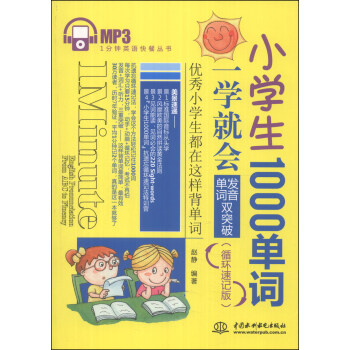

![語感啓濛:經典英文兒歌圖畫書第二輯(套裝共7冊) [3-8歲] pdf epub mobi 電子書 下載](https://pic.tinynews.org/11538406/54110698N9d58ee3c.jpg)
![大傢的日語:中級1(學習輔導用書) [みんなの日本語] pdf epub mobi 電子書 下載](https://pic.tinynews.org/10214374/48da0f7c-4c52-47d8-9479-2d5b62b89271.jpg)
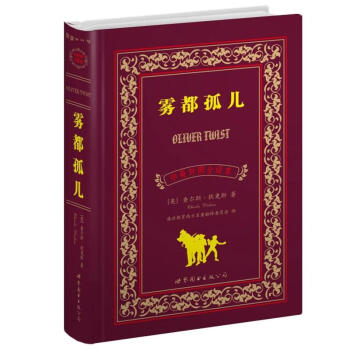
![新概念英語青少版學生用書(3A)(附MP3+DVD光盤2張) [Junior New Concept English] pdf epub mobi 電子書 下載](https://pic.tinynews.org/11222257/rBEhU1MhXCsIAAAAAAdcZxMNLw0AAKBqANTL5gAB1x_204.jpg)


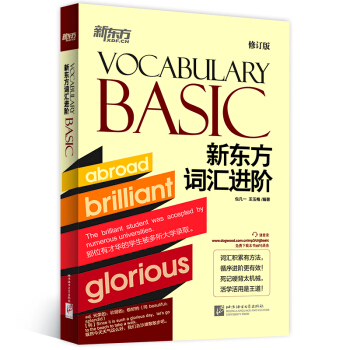



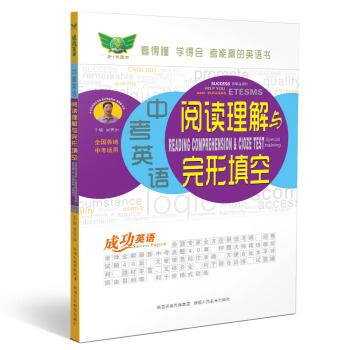
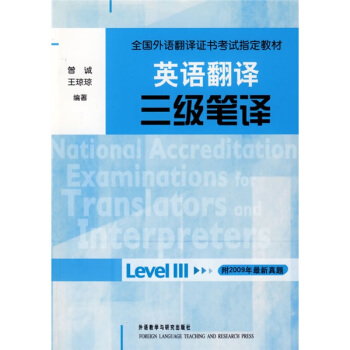
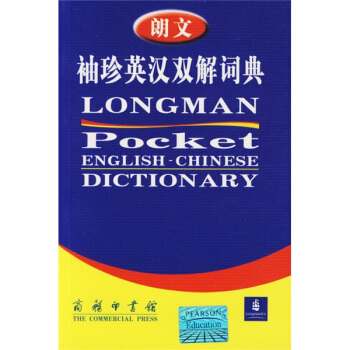

![世界名著典藏係列:人間喜劇:巴爾紮剋小說選(英文全本) [The Human Comedy Selected Works of Balzac] pdf epub mobi 電子書 下載](https://pic.tinynews.org/10104594/rBEIC0_RuOMIAAAAAADhT0UTMS4AAAfjQJzMXMAAOFn046.jpg)